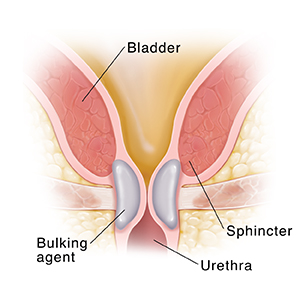Treating Incontinence: Urethral Implants
Treating Urinary Incontinence: Urethral Implants (Bulking Agents)

If you have trouble holding your urine, it may be due to a weak muscle around the urethra. This muscle is called the sphincter. Urethral implants (bulking agents) are one way to help treat stress incontinence due to a weak sphincter. A bulking agent is implanted (injected) into the walls of your urethra. This may help close the sphincter. It can help restore most or all of your control over urine flow. This procedure is often done in the hospital. There are no cuts (incisions) or stitches needed. You will likely go home the same day.
Your experience
-
You will be given medicine (anesthesia) to keep you pain-free. This may be 1 or more of the following:
-
Local anesthesia. This numbs your urethra and bladder.
-
Regional anesthesia. This numbs your body below the waist.
-
General anesthesia. This puts you into a state like a deep sleep.
-
-
The healthcare provider pus a thin tube with a camera (cystoscope) into your urethra. This tool lets the provider see the inside of your urethra.
-
A needle is put into the sphincter area. This may be done through the cystoscope. Or along the outside of your urethra.
-
The provider injects a bulking agent through this needle into the urethra wall. This makes the wall of the urethra thicker. It then closes up. This stops urine from leaking out of the bladder. When you try to urinate, the wall moves apart. This lets urine flow.
-
Urethral implants don't work as well as other surgery for stress incontinence. But they work for most people. About 1 out of 3 people ask for a second bulking injection after the first one.
Possible complications (rare)
-
Short-term or long-term worsening of incontinence
-
Infection of the bladder or urethra
-
Pain or discomfort at the injection site
-
Inability to urinate (urinary retention)
-
Allergic reaction to bulking agent
-
Complications of anesthesia
When to get medical care
Call your healthcare provider if you have any of these symptoms after the procedure:
-
Bleeding
-
Problems urinating
-
Signs of infection:
- Fever over 100.4° F ( 38.0°C ) or higher, or as directed by your provider
- Chills
- Urinating often
- Very strong urge to urinate
Updated:
September 17, 2019
Sources:
Ghoniem, Update on Urethral Bulking Agents for Female Stress Urinary Incontinence due to Intrinsic Sphincter Deficiency, Journal of Urology and Research (2014); 1(2); 1009
Reviewed By:
Marc Greenstein MD,Donna Freeborn PhD CNM FNP,Raymond Kent Turley BSN MSN RN